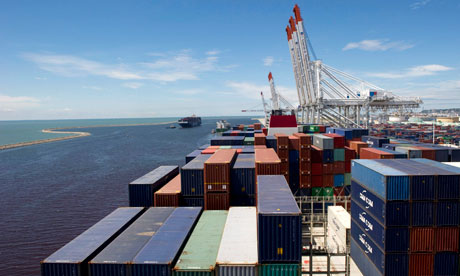Modern cargo ships slow to the speed of the sailing clippers
Posted by Big Gav in energy efficiency, shipping
The Guardian reports that cargo shipping now travels slower than the Clipper ships of 2 centuries ago did, as owners seek maximum fuel efficiency - Modern cargo ships slow to the speed of the sailing clippers.
The world's largest cargo ships are travelling at lower speeds today than sailing clippers such as the Cutty Sark did more than 130 years ago.
A combination of the recession and growing awareness in the shipping industry about climate change emissions encouraged many ship owners to adopt "slow steaming" to save fuel two years ago. This lowered speeds from the standard 25 knots to 20 knots, but many major companies have now taken this a stage further by adopting "super-slow steaming" at speeds of 12 knots (about 14mph).
Travel times between the US and China, or between Australia and Europe, are now comparable to those of the great age of sail in the 19th century. American clippers reached 14 to 17 knots in the 1850s, with the fastest recording speeds of 22 knots or more.
Maersk, the world's largest shipping line, with more than 600 ships, has adapted its giant marine diesel engines to travel at super-slow speeds without suffering damage. This reduces fuel consumption and greenhouse gas emissions by 30%. It is believed that the company has saved more than £65m on fuel since it began its go-slow.
Ship engines are traditionally profligate and polluting. Designed to run at high speeds, they burn the cheapest "bunker" oil and are not subject to the same air quality rules as cars. In the boom before 2007, the Emma Maersk, one of the world's largest container ships, would burn around 300 tonnes of fuel a day, emitting as much as 1,000 tonnes of CO2 a day – roughly as much as the 30 lowest emitting countries in the world.
Maersk spokesman Bo Cerup-Simonsen said: "The cost benefits are clear. When speed is reduced by 20%, fuel consumption is reduced by 40% per nautical mile. Slow steaming is here to stay. Its introduction has been the most important factor in reducing our CO2 emissions in recent years, and we have not yet realised the full potential. Our goal is to reducing CO2 emissions by 25%."
The Royal Navy and BP, meanwhile, are among those adopting different ways to reduce fuel use and cut carbon emissions. The Ark Royal light aircraft carrier, the new Queen Mary 2 cruise liner and 350 other large commercial ships have had their hulls coated with special anti-fouling paint. This has been shown to cut around 9% from CO2 emissions by keeping their bottoms free from barnacles and other sea life.
Some ships have been fitted with kite-like "skysails", or systems that force compressed air out of hulls to allow them to "ride" on a cushion of bubbles. These measures can cut fuel consumption by up to 20%.
Environmentalists say that a reduction in speeds makes sense but warn that there is no guarantee that ships would not revert back to full throttle once economic conditions improve.






